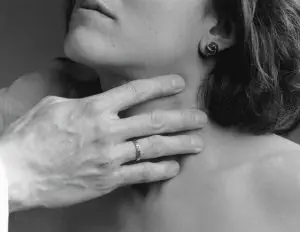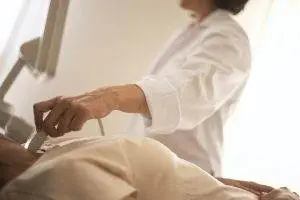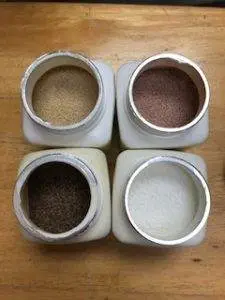By Qineng Tan, L.Ac., Ph.D. and Xiaomei Cai, L.Ac., Ph.D.

Goiter? Bulging eyes? Red eyes, eye pain? Feeling anxious and irritable? Hand tremor? These can all be signs of Graves disease, an autoimmune disorder that causes hyperthyroidism. Acupuncture and TCM can help relieve Graves disease symptoms.
Graves disease is an autoimmune disorder in which the immune system creates antibodies that make the thyroid produce too much thyroid hormone. This is known as an “overactive thyroid,” or hyperthyroidism.
Many different conditions can lead to excessive levels of thyroid hormone, but Graves disease is the most common cause of hyperthyroidism. About 80% of people with hyperthyroidism have Graves disease. Graves disease tends to affect women more often than men.
A person is more likely to have Graves disease if other people in their family have it, or have Hashimoto’s disease. People who have Graves may also have other autoimmune disorders, like Rheumatoid arthritis, autoimmune gastritis, Type 1 diabetes, or vitiligo (an autoimmune skin condition).
As with other autoimmune diseases, there is still limited understanding from a medical research perspective about what exactly causes Graves disease. Graves disease requires attention, as it can lead to serious health issues.
What Is Overactive Thyroid?
The thyroid gland is located in the front of the throat and is responsible for producing hormones that control metabolism, or how the body converts food into energy. The main thyroid hormones are thyroxine (T3) and triiodothyronine (T4).
The thyroid hormones impact many processes in the body, including your metabolic rate (how you use calories), how quickly food passes through your digestive tract, your heart rate, maintenance of body temperature, and the production of new cells to replace dying ones.
Thyroid function can have a big impact on your weight and digestion. Thyroid hormone imbalances can cause skin problems, vision problems, and problems with menstrual cycles, libido, and fertility.
Acupuncture can be an effective treatment for managing hyperthyroidism symptoms.
Top 10 Graves Disease Symptoms
Graves disease most typically begins to show up in midlife, between the ages of 30 and 50. Signs of Graves disease may develop slowly over several weeks or months. Each individual’s experience with symptoms may be different; you may have some of the following symptoms, but not others.
Common symptoms of Graves disease include:
- Rapid weight loss
- Increased appetite
- Diarrhea, more frequent bowel movements
- Rapid heartbeat, heart palpitations
- Feeling shaky, hand tremor, tremor in fingers
- Clammy skin, sweating, feeling hot
- Insomnia, trouble sleeping
- Goiter, enlarged thyroid gland on the front of the throat
- Changes in menstrual cycle
- Muscle weakness
About a third of people with Graves disease will also develop Graves ophthalmopathy, or thyroid eye disease. This happens due to inflammation and swelling of the muscles and tissues around the eyes. This can happen in both eyes, or just one eye.
Graves disease eye symptoms can include:
- Bulging eyes
- Eyelids don’t close all the way
- Puffy eyes, swelling around the eyes
- Eye pain, eye pressure
- Sensitive to light
- Eye irritation, gritty eyes
- Double vision
- Blurred vision
- Red eyes
- Trouble moving the eyes
Treatment for Graves Disease

Diagnosis of Graves disease will usually involve blood tests to check for elevated thyroid hormones and the presence of antibodies that stimulate thyroid hormone production. A thyroid uptake scan will show how much iodine your thyroid absorbs; high absorption of iodine is a sign of Graves disease. A Doppler ultrasound may also be done to see if there is extra blood flow to your thyroid gland.
Graves disease is considered a chronic condition with no cure. However, medications and other interventions can help control thyroid hormone levels. Antithyroid medications like Tapazole block the overproduction of T3 and T4. Side effects of these medications can include itchy skin rashes, nausea, hair loss, muscle pain or joint pain, headaches, dizziness, and other problems. Some people can develop serious liver problems.
Radioiodine therapy, or radioactive iodine ablation (RAI), is a treatment for Graves disease that involves taking radioactive iodine, which, as it is absorbed by the thyroid, will destroy the overactive cells of the thyroid gland. Many patients who undergo this treatment will end up being hypothyroid (low thyroid levels) and will have to have thyroid hormone replacement treatment. RAI treatment can affect the salivary glands, causing dry mouth and sometimes a loss of the ability to taste.
A thyroidectomy is a surgical option, which involves the removal of some or all of the thyroid gland. This may be recommended if a person has a very enlarged goiter, or thyroid gland. As with RAI, this may require that a person takes thyroid hormone replacement in the future. There is a risk that the vocal cords can suffer damage during this procedure, which may affect a person’s voice long-term.
Acupuncture and TCM offers an alternative or adjunct treatment for Graves disease that can help address the root cause of hyperthyroidism as well as help to manage symptoms.
Can Acupuncture Help Graves Disease?

According to TCM theory, hyperthyroidism and Graves disease are related to imbalances in Qi: typically, yin deficiency is the result of excessive yang energy. Stagnation of phlegm in the liver meridian around the throat area can also have an impact on the thyroid gland.
Herbal formulations that help address liver qi stagnation can help relieve many of the symptoms associated with Graves disease, including palpitations, increased heart rate, and insomnia. Other Chinese herb treatments can help to reduce thyroid hormone levels and even the size of an enlarged thyroid.
One study that compared patients who were treated with acupuncture and herbs versus those who were treated with antithyroid medications. Over 95% of the group who received TCM treatment had positive outcomes, while 73% of the group who were given medications saw positive improvement.
Another independent study showed a similar result, with some patients given acupuncture plus conventional medications, while another group received medication only. The acupuncture group had a 96% positive outcome, while the medication only group had a 64% success rate.
One case study of a woman who had tried antithyroid medications but had suffered from hives as a side effect had good results after taking TCM herbs. Her thyroid levels returned to normal and remained in the normal range even after she discontinued the herbs.
An overview of research shows that acupuncture and herbs have the potential to help patients with Graves disease and hyperthyroidism by lowering thyroid hormone levels, relieving stress, improving sleep, and relieving symptoms like tremors and muscle weakness, as well as IBS-like symptoms of diarrhea.
A TCM practitioner can also give personalized advice regarding dietary and other lifestyle changes that can further help to alleviate symptoms and strengthen Qi.
Acupuncture Near Me for Graves Disease in West Los Angeles
Acupuncture and herbal medicine can be excellent modalities for hard-to-treat disorders, because TCM offers a different lens through which we can see health issues like autoimmune disorders and hormonal imbalances. TCM treatments can strengthen a person’s health on the deepest levels, while also relieving a wide variety of symptoms. Acupuncture can be very helpful for thyroid disorders like Graves disease and hyperthyroidism, as well as Hashimoto’s thyroiditis (Hashimoto) and hypothyroidism.
*This article is for education from the perspective of Traditional Chinese Medicine only. The education provided by this article is not approved by FDA to diagnose, prevent, treat and cure human diseases. It should not stop you from consulting with your physician for your medical conditions. Traditional Chinese Medicine is based on Qi, which is an invisible force that usually cannot be observed by modern science. Because science focuses on testing ideas about the natural world with evidence obtained through observation, these aspects of acupuncture can’t be studied by science. Therefore acupuncture and Chinese herbs are often not supported by double-blind, randomized trials, and they are considered alternative medicine therapies in the United States.
